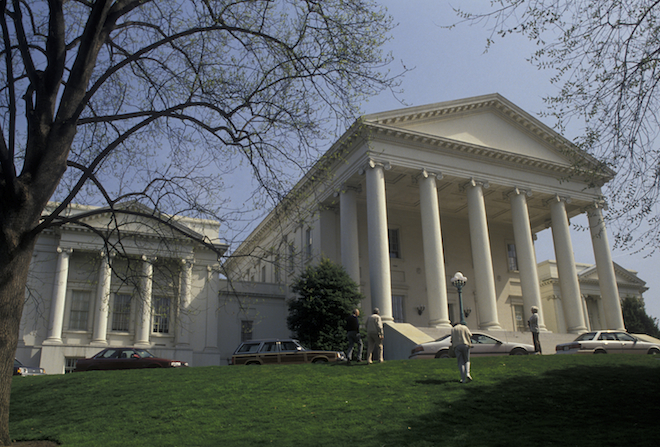There’s an awkward piece of trivia following Virginia Democrats as they rally to stop a Republican plan to allocate electoral votes by Congressional district: several of them once supported similar bills themselves.
Every Democrat contacted by TPM who previously sponsored or voted for such electoral vote changes has since come out against the GOP plan. So has state Sen. John Miller (D), another sitting lawmaker who once backed an electoral vote split in the mold of Maine and Nebraska. Their favored bills — none of which ever came close to passing — were similar to the current proposal by Sen. Charlie Carrico (R), but not identical. Carrico’s would give the state’s two at-large delegates to whichever candidate won the most districts (almost certainly a Republican in the near term), the others would give it to the popular vote winner.
Delegate Vivan Watts (D), who sponsored or co-sponsored a number of bills over the years — including one in 2012 — that would divide Virginia’s electoral votes by Congressional district, told TPM that Virginia’s longtime status as a solid red state played a role in her earlier support.
“I’m age 72 so I spent a lot of years in the wilderness and the last time the state had gone Democratic [before 2008] was following the assassination of John F. Kennedy,” Watts said. “I thought back in those days about how we were just totally ignored.”
Watts says she has since changed her position “180 degres” in response to the post-2010 round of redistricting, which solidified Republican control of the state’s Congressional delegation. Had Carrico’s bill gone into effect last year with that map in place, Mitt Romney would have won nine electoral votes to President Obama’s four, even as he lost the state popular vote.
“I certainly don’t want the situation this bill would represent in which the Congressional vote would run counter to the popular vote,” she said.
Sen. Chap Petersen (D), who backed the senate version of Watts’ bill, said he no longer believed proportional representation by district accurately reflected the will of the voter under the current setup.
“It’s not a question of whether my thinking has evolved,” he told TPM. “The difference is that in the 2011 redistricting plan, which I voted against, all the Democratic voters in the state were packed into three Congressional districts. The deck is stacked.”
Petersen was one of two Democrats to vote for the electoral vote bill in committee in 2008, the other being Sen. Donald McEachin (D). It failed on a 2-9 vote, with Republicans unanimously opposing the bill. McEachin is also opposed to Carrico’s proposal, which he said in a statement provided to TPM was a “sore loser bill” aimed at “defying the will of the voters.”
“As we have seen repeatedly this week, Senate Republicans seem to think that if you can’t win the game, it’s okay to change the rules,” McEachin added.
The Carrico plan, which passed out of a senate subcommittee on a tie vote this week, looks unlikely to become law. So far two Republican senators have come out against it, more than enough to block the bill assuming Democrats, as expected, maintain a unified front against its passage.









